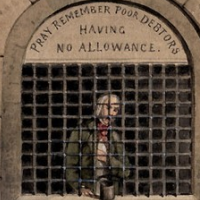Debtors’ Prisons may be Illegal, but they still Exist in Texas and Washington
 A debtor in London's Fleet Street Prison, early 19th century (graphic: Thomas Hosmer Shepherd, Wikimedia)
A debtor in London's Fleet Street Prison, early 19th century (graphic: Thomas Hosmer Shepherd, Wikimedia)
Going to prison for being poor is supposed to be illegal in the United States, but courts in at least two states are still locking up people for being unable to pay fines for minor offenses.
A Buzzfeed investigation in Texas uncovered dozens of cases of people spending days, weeks and even months in jail because they could not pay traffic fines. The practice of imprisoning the poor violates “Texas law and two unanimous Supreme Court decisions, all of which bar courts from jailing people simply because they are too poor to pay their fines,” Kendall Taggart and Alex Campbell reported.
Texas law clearly states, they found, that judges are supposed to hold a hearings to assess defendants’ finances before they’re sentenced to jail. The judge must also offer community service to those too poor to pay fines. Only if the person fails to make a good-faith effort to perform community service can they be jailed for not to paying fines.
But in El Paso, where 20% of residents live below the poverty line, municipal court judges regularly send people to jail without holding a poverty hearing or offering community service, according to BuzzFeed. Of 100 cases of people being jailed for at least five days last year, not one showed that the judge had considered the defendant’s ability to pay before locking them up.
“I just find this to be outrageous,” Susan Crump, professor at South Texas College of Law, told Buzzfeed. She said judges who jail people because they are too poor to pay are either “not knowing, or not able to read the law, or not caring.”
Some judges even claim defendants want to go to jail rather than perform community service. Lubbock, Texas, Judge Robert Doty says his poor defendants are “fine and dandy” with being locked up. “They get three meals a day,” he said, “and a bed to sleep in.”
The use of jails as debtors’ prisons also occurs in Benton County, Washington, according to a lawsuit filed in state court. The three plaintiffs say county courts unconstitutionally imprison “scores of indigent persons” on any given day or force them to serve on work crews.
The “debtor’s prison system” violates the due process and equal protection clauses of the Fourteenth Amendment and the Washington State Constitution’s “prohibition of incarcerating a person for nonpayment of LFOs (legal financial obligations) without a meaningful, pre-deprivation, ability-to-pay hearing and consideration of alternatives,” according to Courthouse News Service.
In addition to violating the constitution, the practice of jailing those who can’t pay fines is costly. El Paso spends about $375,000 to incarcerate those who are too poor to pay fines, thus punishing taxpayers along with debtors.
-Noel Brinkerhoff
To Learn More:
Their Crime: Being Poor. Their Sentence: Jail. (by Kendall Taggart and Alex Campbell, BuzzFeed)
‘Debtors’ Prison’ Challenged in Washington (by June Williams, Courthouse News Service)
New Orleans Criminal Court Systems Accused of Milking the Poor with Exorbitant Fees (by Noel Brinkerhoff and Steve Straehley, AllGov)
Stealth Return of Debtors’ Prison in Ohio (by Noel Brinkerhoff, AllGov)
Supreme Court Takes a Step Closer to Debtors’ Prison (by Noel Brinkerhoff, AllGov)
- Top Stories
- Unusual News
- Where is the Money Going?
- Controversies
- U.S. and the World
- Appointments and Resignations
- Latest News
- Trump Renames National Football League National Trump League
- Trump to Stop Deportations If…
- Trump Denounces World Series
- What If China Invaded the United States?
- Donald Trump Has a Mental Health Problem and It Has a Name






Comments